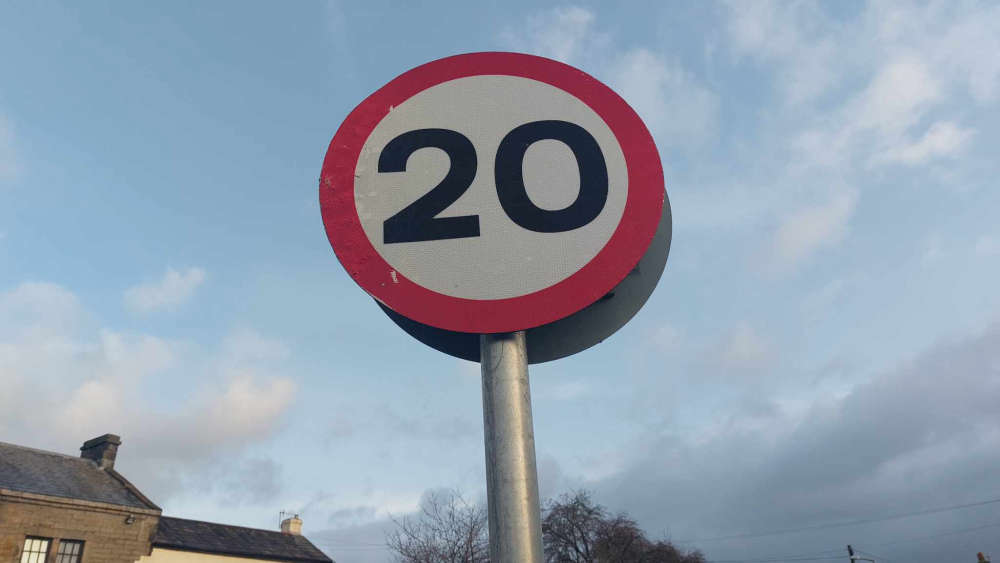Lancaster councillor slams government’s Plan for Drivers as an …

A Lancaster councillor has accused the government of "attacking 20mph speed limits" during a heated debate on a plan designed to make driving easier for motorists. County Councillor Gina Dowding of the Green party said she felt the government's Plan for Drivers was "trying to divide people". She was speaking at a meeting of Lancashire County Council after a Conservative councillor asked for support for the plan.
The government says its Plan for Drivers aims to "support motorists by making driving as straightforward, accessible, environmentally responsible and safe as possible". But County Councillor Dowding, who represents Lancaster Central, said: "The Plan for Drivers is a desperate attempt by Rishi Sunak to steer a few voters his way by using car driving to divide people. "Thirteen years of Tory policies and underinvestment in public transport and the bus services has forced so many people to use cars.
We're not all car drivers and we're not only car drivers. Many of us use various forms of transport at different times. "You talk about stopping unfair enforcement.
We don't want more people parking on yellow lines, blocking corners, blocking visibility. We don't want more people getting away with speeding. I don't know what reality you live in.
The vast majority of the public want better enforcement. "In my district, Lancaster, 22.7 per cent have neither car nor van. In Morecambe town over 40 per cent of households have neither car nor can.
Plus there are people who would rather not use their cars but feel forced into using their cars because the alternatives are unreliable, expensive or unsafe. "Safer quieter streets should not be about politics. The vast majority of people across Lancashire agreed we need safer streets, cleaner air and to tackle the climate crisis.
"By attacking 20mph zones, low traffic neighbourhoods and other measures designed to improve the lives of residents, the Conservatives are declaring war on clean air and health. You have shown you are willing to sacrifice lives." Later, County Councillor Dowding (pictured) said: "Their Plan for Drivers is essentially about attacking 20mph speed limits and other measures designed to improve the lives of local residents."
 The Plan for Drivers sets out how the government is working to "improve the experience of driving and services provided for motorists". It focuses on issues including:
The Plan for Drivers sets out how the government is working to "improve the experience of driving and services provided for motorists". It focuses on issues including:
- smoother journeys
- stopping unfair enforcement
- easier parking
- cracking down on inconsiderate driving
- helping the transition to zero emission driving
The plan includes a list of actions that the government says it will "pursue with local authorities and others to ensure drivers get a fair deal alongside other road users".
It says they will "update guidance (in England) on 20mph speed limits". "While 20mph zones are an important tool in improving road safety in residential areas, over-use risks undermining public acceptance, so we are clear that 20mph zones should be considered on a road-by-road basis to ensure local consent, not as blanket measures," it says. At the meeting, County Councillor Ash Sutcliffe (pictured), a Conservative councillor for Pendle Central, called for the council to welcome the plan and integrate it with council policies "to ensure its benefits are maximised for Lancashire residents".
 "We really do rely on cars," he said. "Where journeys are smoother they emit less toxic gases caused by idling.
"We really do rely on cars," he said. "Where journeys are smoother they emit less toxic gases caused by idling.
Where access to EV charging is enhanced, electric car usage goes up. "This makes our roadside pavements and cycle lanes better places to be. "The Plan for Drivers supports those who choose to travel by car but also implements meaningful change for the people of Lancashire.
"Today I walked, I took a bus and I got a train to get here, but I could also choose to get here by car. When I do that I want it to be safe, environmentally responsible and straightforward. That is what the Plan for Drivers does."
County Councillor Kim Snape, a Labour and Co-Operative councillor for Chorley Rural East, asked for an amendment to protect 20mph speed limits and for the government to devolve 5p in the pound petrol duty to help councils repair roads. Criticising the original motion, County Councillor Erica Lewis (pictured), a Labour councillor for Lancaster South East, said: "What is the commitment to action that Lancashire County Council is taking on this? This is not a commitment for the council to take action, this is an opportunity for councillors of the current administration to talk about government policy and it's not something you should be facilitating."
 The amendment was voted down and County Councillor Sutcliffe's original motion was voted through by the Tory-led council, during the meeting at County Hall on December 14. You can read the full Plan for Drivers here. [1]
The amendment was voted down and County Councillor Sutcliffe's original motion was voted through by the Tory-led council, during the meeting at County Hall on December 14. You can read the full Plan for Drivers here. [1]
The plan includes
Smoother journeys
1. Bus lanes only when they are needed. Strengthen guidance to make sure bus lanes help rather than hinder traffic by operating only when buses are running, or when traffic is heavy enough to cause delay to buses.
2. Making better use of bus lanes. Issue a revised Traffic Advisory leaflet to guide local authorities on allowing motorcycles to use bus lanes and hold a consultation about whether motorcycle access should be standard.
3. Safer breakdown recoveries. Permitting red flashing lights for breakdown vehicles, helping to protect recovery drivers by making them more visible at the roadside.
This measure will apply to England, Scotland, and Wales.
4. Smarter road closures. Support councils to introduce more Lane Rental schemes, which reduce roadworks by incentivising utilities to avoid the busiest roads at the busiest times.
This has been successful in London, and we want to see them nationwide, stopping lengthy road closures for utility works.
5. Fixing roads faster. Consult on requiring local authorities with Lane Rental schemes to use at least 50% of any surplus on pothole repairs or resurfacing.
6. Encouraging efficient street works. Consult on extending fines for overrunning street works at weekends and increasing fixed penalty notices.
7. Harnessing the latest road technology. Roll out the Live Labs 2 programme[2] to explore new, low-carbon and high-tech ways of managing local highway networks, supporting the transition to net zero carbon local roads and infrastructure.
This measure will apply UK-wide.
8. Better road data. Develop a New Road Condition Data Standard to provide local authorities with access to new technologies, enabling them more easily to identify and deal with road defects like potholes.
9. Better traffic lights. A GBP30 million fund to upgrade traffic signal systems, replacing unreliable and obsolete equipment to improve reliability.
10. Smarter traffic lights. A GBP20 million 'Green Light Fund' to tune up traffic signals to better reflect current traffic conditions and get traffic flowing.
11. Cutting-edge traffic flow management. Funding worth GBP20 million to deploy advanced technology for traffic signals, making use of machine learning and artificial intelligence (AI) to optimise traffic flow and balance traffic across city centres.
Stopping unfair enforcement
12.
Right speed limits in the right places. Update 20mph zone guidance for England to help prevent inappropriate blanket use.
13. Stop local authorities using so-called "15-minute cities" to police people's lives.
Consult on measures including the removal of local authorities' access to Driver and Vehicle Licensing Agency (DVLA) data to enforce such schemes by camera.
14. New guidance on low traffic neighbourhoods (LTN). Focus on the importance of local support and consider as part of the LTN review how to address existing LTNs that have not secured local consent.
15. Fair fines. Strengthen government and sector-led guidance on enforcement of moving traffic offences, such as entering yellow box junctions, to ensure consistency and stop drivers from being penalised unfairly.
16. Take the profit out of traffic enforcement. Call for evidence on options to restrict local authorities' ability to generate surpluses from traffic offences and over-zealous use of traffic enforcement powers.
Easier parking
17.
Better parking technology. Deliver the new National Parking Platform[3] - will be open to parking providers across the UK - by autumn 2024, ending the need to use multiple parking apps.
18. Challenge unfair parking rules.
Consult on revising guidance about the public's right to challenge local authority parking policies.
19. Find parking more easily. Digitised traffic regulation orders will help easily identify where it is legal to park anywhere in the country.
Inconsiderate driving
20.
Fairer insurance claims. Consult on removing the right of uninsured drivers to claim compensation for property damage. This measure will apply to England, Scotland and Wales.
21. Better driving. Communications campaign and enforcement to tackle lane hogs and other inconsiderate driving on the motorway.
22. Quieter neighbourhoods. Allow local councils to roll out noise cameras to target unacceptable vehicle modifications.
23. Cleaner roads. Clamp down on roadside littering, extending the trial on camera enforcement across the strategic road network.
Transition to zero emission driving
24.
Speed up grid connections. Review grid connections process for EV chargepoints, with aim to accelerate it. This measure will apply to England, Scotland and Wales.
25. Faster chargepoint installation. Consult on measures to speed up the approvals process for installation of chargepoints.
26. Greener schools. Provide dedicated, targeted support for schools to install chargepoints, using existing grants.
This measure will apply UK-wide.
27. Easier on-street charging. Widen eligibility of EV chargepoint grants to include cross-pavement solutions, to make EV ownership a more practical option for those without off-street parking.
This measure will apply UK-wide.
28. Safer on-street charging. Provide guidance on the use of safe cross-pavement solutions.
29. Easier chargepoint installation. Consult on the expansion of permitted development rights, making private chargepoint installation cheaper and easier.
30. Getting the word out. Work with industry to myth-bust concerns about EVs.
This measure will apply UK-wide.
References
- ^ You can read the full Plan for Drivers here. (www.gov.uk)
- ^ Live Labs 2 programme (www.adeptnet.org.uk)
- ^ National Parking Platform (npp-uk.org)